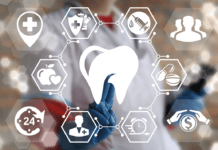Many people, including our patients, do not realize the demands of the dental hygiene profession, especially physically. I was not aware of the aches and pains before either. Even in school, I was more focused on completing the program. In dental hygiene school, we did not see half as many patients in comparison to the real world.
Not all “aches and pains” are physical. Here are some challenges many dental hygienists face.
1) Physical Pains
We are warned that there is a higher prevalence of back, neck, and wrist issues in the profession. This is due to all the twists, turns, repeated motions, and crazy positions. It all comes back to ergonomics. We are taught the correct chair and patient positions, loupes benefits, standing vs. sitting options, unique instrumentation, and different stretches to help throughout the workday.
Even with good positioning, you may sometimes experience some aches. Each of us is different. Doing daily stretches can be extremely helpful. It is important to understand the limits of your body. The “powering through” mentality can cause more issues than solutions. When something does not feel right, do not ignore your body telling you something. Seek out your medical professionals. This could include your primary or even a chiropractor.
2) Stress from those Packed Schedules
When you are in dental hygiene school, you see a few patients a week. Then we enter the real world, and we are expected to get through a full-day schedule. It takes time to find your groove and figure out your system of attack. Moving from one patient to the next can be very problematic if you do not have a chance to stretch or have a quick break.
Then, we all have those patients who do not consider that there are patients before and after them. When those patients arrive late, you must hustle even more to stay on time. Once a patient leaves, there is still work to be done. Picking up the speed may need to occur. You may have a co-worker helping you break down and set up your room. This rushing around is both physically and mentally demanding. When you want to stay on time, stress occurs when you are running behind.
Getting a massage can be an option to help with mental stress as well as physical aches and pains. Practicing breathing in and out in the operatory can reduce stress. Taking a few seconds before grabbing your next patient to calm down, breathe, stretch, or sip water is important.
3) Emotional Health
With the repetitious schedules and routines every day, burnout can happen, especially with the additional difficulties seen throughout the COVID-19 pandemic. Burnout is the real deal right now.
Each person can experience burnout differently. Some people become very bored and tired with where they are at in their job. They can question if they will want to stay at their current job or even the profession. It is normal to feel like this at times. Confiding with a friend, a family member, or a trusted co-worker can help talk out the situation. Talking with others in the field can make you feel better and not make it seem like you are the only one.
The workplace environment also plays a factor in your mental and emotional health as well. It may start with emotional or mental health but can progress to physical health as well.
Think about your job right now. Who are you surrounded by when you are working? Do you like where you work? How’s your patient schedule and shift schedule? Do you like your hours? Are you overworking yourself? Do you want more hours? Dreading to wake up and go to work can be miserable each and every day if you do not like where you work. Weigh out the pros and cons.
Don’t get me wrong. There are better days than others. Every day at work is not perfect, and that is OK!
The overall take-away message is self-care. If you are not healthy, how can you perform and care for your patient? We say this to our patients. If your mouth is not healthy, then your body is not healthy (and vice versa). Staying healthy can be different for each person. This could involve treating yourself to a massage, having wellness visits to other health professionals, eating healthy, yoga, exercising, or meditation.
There is a need for a good balance of work and relaxation. Understanding what works best for you is crucial for your professional and personal health!











